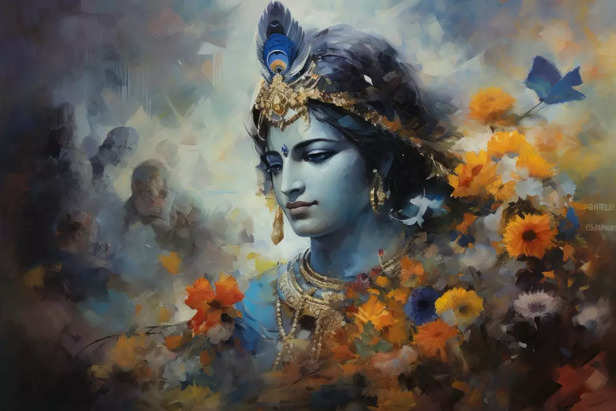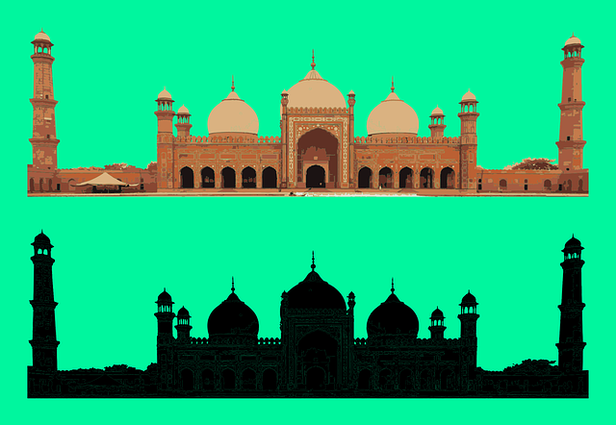Was Prophet Muhammad the Krishna of Islam? The Shocking Truth!
Tarun Badghaiya | Mar 10, 2025, 12:39 IST

Is Prophet Muhammad the Krishna of Islam? This engaging issue tests religious boundaries and prompts a fascinating comparative examination. While Krishna is considered an avatar of Vishnu in Hinduism, Prophet Muhammad is Islam's final messenger, a mortal who delivers God's truth. Both played essential roles in moving humanity to righteousness, but their theological foundations are profoundly different. This essay investigates their commonalities in leadership, moral teachings, and divine communication while emphasising significant distinctions in divinity, worship, and spiritual philosophy. Could they be two sides of the same heavenly mission, or does this comparison highlight deeper differences?
The subject of whether Prophet Muhammad is the Krishna of Islam is intriguing, necessitating a thorough examination of both Islamic and Hindu traditions. Krishna, a key figure in Hinduism, is considered Vishnu's eighth avatar and serves as a celestial defender and guide. Prophet Muhammad, on the other hand, is Islam's final prophet, conveying the message of monotheism through the Quran. While the two personalities come from different religious traditions, an examination of their roles, messages, and attributes reveals both striking similarities and essential contrasts.
Krishna is one of the most revered deities in Hindu mythology, particularly in the Bhagavad Gita, where he acts as Arjuna's heavenly counsellor on the battlefield of Kurukshetra. His teachings emphasise dharma (righteousness), devotion, and the significance of carrying out one's responsibilities without attachment to the outcome. Krishna is celebrated for his heavenly playfulness, miracles, and profound wisdom.
"When there is a drop in righteousness and an increase in unrighteousness, O Arjuna, I manifest myself. "I appear in every age to protect the good, destroy the wicked, and establish dharma." According to this passage, Krishna appears to restore balance and righteousness to the earth. He is commonly regarded as a divine figure rather than a normal human being.

Prophet Muhammad (570-632 CE) is Islam's ultimate messenger, conveying God's revelations in the Quran. He is not considered divine but is the ultimate human example for Muslims to follow. His responsibility was to develop monotheism, social justice, and a decent way of life.
"Muhammad is not the father of any of your men, but he is the Messenger of Allah and the last of the prophets."
Islam denies the concept of divine incarnation, emphasising that Muhammad was a mortal chosen to preach God's message. His purpose was to improve society by eliminating idolatry, encouraging social equality, and emphasising the worship of one God (Allah).

Krishna's role in the Bhagavad Gita is to guide Arjuna to righteousness (dharma), similar to Muhammad's role in bringing mankind to the path of Islam. Both men aimed to build moral order and guide people towards ethical behaviour.
Krishna was a warrior, statesman, and philosopher, influencing the course of history in the Mahabharata.
Muhammad was a political leader, military commander, and spiritual advisor who influenced the direction of Islamic history.
Krishna is portrayed as a Vishnu incarnation who reveals infinite wisdom.
Muhammad got divine revelation from the angel Jibreel (Gabriel), which he recorded in the Quran.
Krishna urged Arjuna to fight the righteous war (Kurukshetra) and taught him the fundamentals of just warfare.
Muhammad commanded battles such as Badr and Uhud to defend his people and establish Islam, emphasising jihad (fighting in God's path).
Krishna is revered as God's incarnation, whereas Muhammad is simply human and not divine.
Islam condemns all forms of Muhammad deification, emphasising monotheism instead.
Hinduism accepts polytheism and the concept of divine incarnation.
Islam is purely monotheistic, rejecting all forms of divine manifestation.
Krishna's teachings in the Bhagavad Gita emphasise devotion (bhakti), selfless action (karma), and knowledge (jnana).
Muhammad's teachings emphasise allegiance to one God (Islam), moral behaviour, and the need to adhere to divine laws (Sharia).
Krishna accomplished various miracles, including lifting Govardhan Hill and revealing his cosmic form (Vishwaroopa).
The Quran is considered Muhammad's greatest miracle, with few supernatural happenings credited to him in Islamic history.
From a logical and mythological standpoint, Krishna and Muhammad play similar roles as spiritual teachers and moral reformers, yet they come from fundamentally different theological foundations.
In Hindu Terms: From a Hindu perspective, Muhammad could be viewed as a great rishi (sage) or a predicted figure who brought dharma to a certain territory. Some interpretations of Hindu writings, such as the Bhavishya Purana, indicate a prophetic mention of a character resembling Muhammad.
In Islamic terms, Krishna is not considered a prophet because he is revered as an incarnation of God, which contradicts Islamic monotheism. However, some Muslim scholars admit that people from Hinduism could have been earlier prophets whose teachings were later altered.
 While Krishna and Muhammad served as spiritual teachers, their personalities and teachings were fundamentally different. Krishna is revered as a divine entity, but Muhammad is regarded as a prophet who brings God's last message. Their messages align in promoting righteousness, duty, and devotion to a higher power, but the way they are perceived in their respective religions is vastly different.
While Krishna and Muhammad served as spiritual teachers, their personalities and teachings were fundamentally different. Krishna is revered as a divine entity, but Muhammad is regarded as a prophet who brings God's last message. Their messages align in promoting righteousness, duty, and devotion to a higher power, but the way they are perceived in their respective religions is vastly different.
Thus, from a theological sense, Prophet Muhammad is not the Krishna of Islam because Islam does not accept the concept of supernatural incarnations. However, from a philosophical and ethical standpoint, these men have a mission to lead humanity to righteousness. The comparison promotes interfaith understanding while recognising the unique characteristics of both traditions.
1. Understanding Krishna and Hinduism
A. In the Bhagavad Gita (4:7-8), Krishna asserts,

krishna
2. The Prophet Muhammad in Islam.
A. Quran (33:40) states:
Islam denies the concept of divine incarnation, emphasising that Muhammad was a mortal chosen to preach God's message. His purpose was to improve society by eliminating idolatry, encouraging social equality, and emphasising the worship of one God (Allah).

mosque
3. Key Similarities and Differences between Krishna and Muhammad.
Similarities:
A. Messengers of righteousness.
B. Charismatic Leaders
Muhammad was a political leader, military commander, and spiritual advisor who influenced the direction of Islamic history.
C. Divine Communication
Muhammad got divine revelation from the angel Jibreel (Gabriel), which he recorded in the Quran.
D. Role in war and conflict
Muhammad commanded battles such as Badr and Uhud to defend his people and establish Islam, emphasising jihad (fighting in God's path).
Differences
A. Divine versus human nature.
Islam condemns all forms of Muhammad deification, emphasising monotheism instead.
B. Concept of God
Islam is purely monotheistic, rejecting all forms of divine manifestation.
C. Spiritual Approach.
Muhammad's teachings emphasise allegiance to one God (Islam), moral behaviour, and the need to adhere to divine laws (Sharia).
D. Miracles & Divine Powers
The Quran is considered Muhammad's greatest miracle, with few supernatural happenings credited to him in Islamic history.
4. Can Krishna and Muhammad be viewed as parallels?
In Hindu Terms: From a Hindu perspective, Muhammad could be viewed as a great rishi (sage) or a predicted figure who brought dharma to a certain territory. Some interpretations of Hindu writings, such as the Bhavishya Purana, indicate a prophetic mention of a character resembling Muhammad.
In Islamic terms, Krishna is not considered a prophet because he is revered as an incarnation of God, which contradicts Islamic monotheism. However, some Muslim scholars admit that people from Hinduism could have been earlier prophets whose teachings were later altered.

KRISHNA
5. A shared mission, different identities.
Thus, from a theological sense, Prophet Muhammad is not the Krishna of Islam because Islam does not accept the concept of supernatural incarnations. However, from a philosophical and ethical standpoint, these men have a mission to lead humanity to righteousness. The comparison promotes interfaith understanding while recognising the unique characteristics of both traditions.
